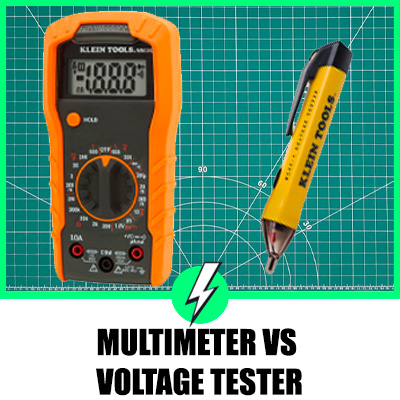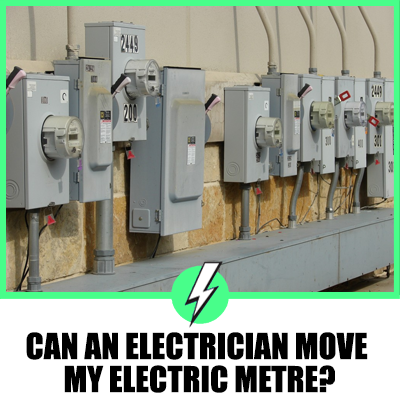Multimeter Vs Voltage Tester
Most aspiring electricians have an idea about multimeter and voltage testers. But the same can be said about those who work outside the electrical industry. Hobbyists and DIYers tend to have a good knowledge of appliances and types of equipment.
For electricians, a thorough understanding of tools, including measuring and testing, is necessary for the job. But of course, homeowners and hobbyists can benefit from the knowledge too! Both the tools are primarily used for testing in electrical works and have similar functions as well. However, between a multimeter and voltage tester, there are some key differences.

So we discuss these differences in today’s post.
Let’s start with the definitions.
Contents
Multimeter
Multimeter, according to Wikipedia, is an electronic measuring tool that comes with multiple measuring functions. A multimeter may be either analogue or digital, but the most popular ones are the digital types. Other names of multimeter include multitester and VOM or volt-ohm milliammeter.
Voltage tester
A voltage tester is also a piece of electrical equipment. Other names of a voltage tester are test light, mains tester, and test lamp.
Multimeter and voltage tester – The similarities
To give the two electrical tools a fair comparison, here is a look at the similarities between multimeter and voltage tester.
- Both these tools can measure voltage in an electrical circuit.
- To use a multimeter and voltage tester, the presence of electricity is necessary.
- You can use both tools as handheld devices.
Multimeter vs voltage tester – The differences
The similarities between a multimeter and voltage tester are not much as you can see. In fact, the two tools have more differences than similarities. These include:
Design
A multimeter has a more advanced design than a voltage tester. In simple terms, multimeters have multiple parts along with a digital display. Other components include switches, buttons and range resistors.
By comparison, voltage testers have simple almost crude design. Depending on the type of voltage testers, there are slight differences. Nevertheless, all of them have simple designs.
Function
A multimeter can measure and test voltage in an electrical circuit. Also, even low-end multimeters can measure resistance and current. Furthermore, high-end multimeters can measure frequency, inductance, capacitance, acidity, temperature, and relative humidity.
A voltage tester is almost exclusively for testing voltage on a conductor. You can also test the presence of electricity in pieces of equipment.
In this regard, a multimeter can replace a voltage tester. However, a voltage tester cannot replace a multimeter.
Voltage range
A multimeter typically comes with a voltage range of 200mV to 2000 volts. Depending on the type, a voltage tester can test AC voltages up to 2000 volts and even higher.
Types of multimeters
There are two types of multimeters. These are:
- Analogue multimeters – The oldest among the two, analogue multimeters are not as popular in the modern-day. However, veteran electricians prefer using the analogue ones for its sensitivity to circuit changes. But on the flip side, analogue multimeters have limited range and are not very affordable. Check out this analogue multimeter, if you are looking for one.
- Digital multimeters – Digital multimeters have become very popular in recent years. The reason is that these multimeters deliver readings that are very precise and have a more comprehensive range than their older counterparts, aka analogue multimeters. Besides, digital multimeters are also more durable and come at a relatively lower price. We like this digital multimeter for a combination of useful features and affordable pricing.
Types of voltage testers
Despite its simplistic design, there are different types of voltage testers. These include:
- Non-contact voltage testers – By far, the most common types of voltage testers are non-contact ones. These look like a fancy pen and allow you to detect changing electric field around objects by appearance.
Non-contact voltage testers do not require direct metallic contact with the circuit to detect voltage. The voltage range of these testers is about 100 to 1000 volts. If you are looking for a recommendation, might we suggest this one from Labgear?
- One-contact neon test lights – These screwdriver looking voltage testers light up when it detects current in the circuit. They are inexpensive and effortless to use, which is why even homeowners have them in their toolbox. Most of these testers have a voltage range between 100 to 500 volts. However, they do not meet the UK GS 38 construction requirements. If you are still interested, take a look at this tester.
- Two contact test lights – These are also known as two-pole test lights. They are instantly recognisable by two points – a screwdriver and an insulated lead point. These voltage testers come with the highest capacity and can measure up to 2000 volts and higher. Most of these voltage testers also double as continuity testers.
These type of voltage testers are also more pricey than their cousins. But they are GS38 complaint and are the safest to use as well. This two-pole voltage tester from Martindale is among our team’s favourite. The tester has a suitable voltage range, and it also functions as a continuity tester.
Price
When it comes to price, multimeters are way up there. Some low-end multimeters can be affordable, but they do not measure up in performance. Besides, a substandard multimeter can compromise your safety, so it is not worth it.
Correspondingly, high-end multimeters that have lab-grad features can have a price tag ranging into thousands. However, for most electricians, a mid-priced multimeter will suffice for electrical jobs.
On the other hand, you can get a top of the line voltage tester under fifty pounds which is fantastic.
Final Words
A multimeter and voltage tester serve their purpose for electricians as well as homeowners. Although a multimeter is a versatile tool, it may not be an absolute necessity if you are a homeowner. For electricians, though, it is a different matter.
A multimeter and voltage tester that meets the industry standards should be an essential part of your arsenal. After all, you never know when this testing equipment will come in handy, whether at work or home.





